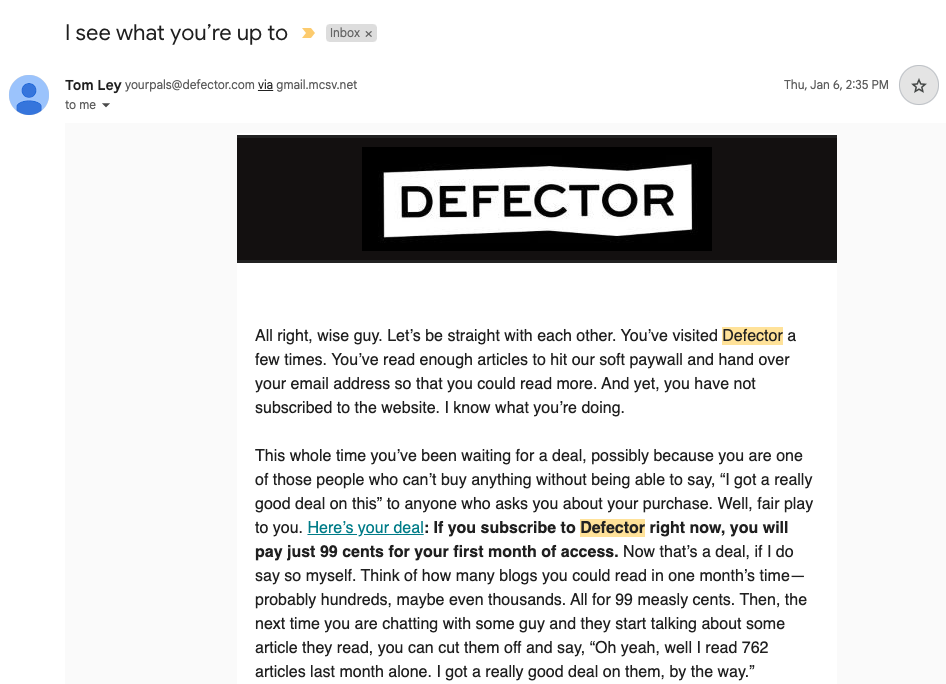
Defector, the employee-owned sports and culture website founded by former Deadspin staffers, had another good year.
Their second annual report shows the news site brought in $3.8 million and nearly every dollar came from readers. Just as in its first year, 95% of revenue came from subscriptions and the rest from site sponsorships, podcast advertising, live event ticketing, monetization of their Twitch, Amp, and YouTube channels, and merch like their “Quit Your Job” hoodie and “Defecator” one-piece for infants. With operating expenses totaling $3.7 million, Defector was profitable in its second year.
During year two, Defector experimented with promotional pricing for the first time — $0.99 for the first month — and said more than 60% of the 2,000 people who subscribed to the promo rate converted to full-price subscriptions.Defector promoted the deal with pop-ups on their website, tweets, and emails to a list of about 150,000 non-paying readers. Their most successful email “generated ~1.5x the normal open rate and ~2x the normal clickthrough rate of our subscription appeal emails,” according to the report.
But the email from editor-in-chief Tom Ley also generated “several complaints” that the subject line (“I see what you’re up to”) was somewhere between “creepy” and “alarming.”
Here’s the lightly menacing email in question:

“Despite that email’s effectiveness, we have since tried to stay away from creepy subject lines,” the report reads.
Total subscription revenue rose from about $3 million in year one to $3.6 million in year two and Defector ended its second year with roughly 2,000 more active subscribers than it had the year before. (That’s 36,000 active subscribers at the end of year one to 38,000 at the end of year two.) At one point, in September 2022, Defector reached “a high-water mark” of 41,000 active subscribers.Defector is trying to address the churn and reached out to former subscribers with a short survey over the summer. More than 60% of ex-subscribers said they felt they weren’t reading enough to justify the subscription cost and 40% cited financial hardship as a reason they canceled. (Respondents could pick multiple reasons.) Other explanations included seasonality in the sports calendar (e.g. readers who only wanted to read about the NFL), article quantity, article quality, and user experience issues.
A major bright spot in Defector’s annual report is their hit podcast Normal Gossip. When I wrote about the show in June, a little more than 500 people had signed up as paid subscribers. That number has jumped to more than 2,500 — accounting for roughly 5% of all Defector subscribers.We’ve gotten helpful feedback by reaching out to people who have cancelled their subscriptions, and also this comment from our own Ray Ratto. https://t.co/ejmU9a697I pic.twitter.com/qPIdkdCDeu
— Defector (@DefectorMedia) October 27, 2022
In its outlook for year three, Defector said it expects the podcast to be “the major driver of growth in non-subscription revenue” as well. (The podcast’s first live events have sold out quickly, and more are planned.)
Here’s Normal Gossip host Kelsey McKinney, sounding proud as all heck:
You can see that in the year two annual report, which is out today. We are taking (calculated!) risks that no other media company is making despite having LESS money and LESS of a safety net. And people WANT to pay for that because the product is good. https://t.co/sxc6fsiBw9
— kelsey mckinney (@mckinneykelsey) October 27, 2022
Other tidbits from Defector’s annual report:
— Currently, the cheapest subscription tier costs $8/month or $79/year. Approximately 62% subscribe at that level, another 32% at $12/month or $119/year, and 5% via Normal Gossip podcast subscriptions (starting at $5/month). And 70 people subscribe at the $1,000/year “Accomplice” level.
— Defector considered raising subscription prices before 20,000 annual subscriptions were set to renew last month, but ultimately decided against it. (They get pretty technical about the why in footnote no. 7.)
— For small teams, some things just aren’t worth the effort. For Defector, those things include actively seeking out site sponsorships (“As currently constituted, our operations team is inexperienced and/or bad at sales. We will very much still consider inbound requests from brands”), a holiday subscription gifting campaign (Defector sold about 300 in 2021, half of what a similar campaign yielded the year before), and paid digital advertising (“We realized we did not have the expertise nor the bandwidth each week to really learn from and optimize our campaigns”).
— Their goals for year three? To run it back, with a larger “top of the funnel.”
Overall, our goals for Year 3 are 1) Making enough money to keep making Defector what we want it to be; and 2) Reaching more people with our work. We remain very proud of this business we’ve built and the community around it. https://t.co/ejmU9aoilQ
— Defector (@DefectorMedia) October 27, 2022
You can read the full, admirably candid report here.